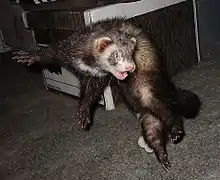Weasel war dance
The weasel war dance is a colloquial term for the behavior of excited ferrets and other members of the weasel subfamily. Naturalists speculate that weasels in the wild use the dance to confuse or disorient prey.[1]

In domestic ferrets
In domestic ferrets the war dance usually follows play or the successful capture of a toy or a stolen object. The war dance is commonly held to mean that the ferret is thoroughly enjoying itself.
The behavior consists of a frenzied series of hops sideways and backwards, often accompanied by an arched back and a frizzed-out tail. Ferrets are notoriously clumsy in their surroundings during their dance and will often collide with or fall over objects and furniture.[2]
The war dance usually includes a clucking vocalization, known among domestic ferret owners as "dooking". It normally indicates happiness. Although the war dance may make a ferret appear frightened or angry, they are often just excited and are generally harmless to humans.
In the wild
The stoat (also known as the ermine or the short-tailed weasel) reputedly mesmerises prey such as rabbits by a "dance" (sometimes called the weasel war dance), though this behaviour could be linked to Skrjabingylus infections.[3]
References
- King, Carolyn M.; Powell, Roger A. (12 October 2006) [1989]. The Natural History of Weasels and Stoats. Oxford University Press. p. 120 – via Google Books.
- Balmain, David (2008). Ferret. O'Reilly Media. p. 101. Retrieved 9 June 2011 – via Google Books.
- Harris & Yalden 2008, p. 463
External links
- Ferret doing war dance in snow (video) – via YouTube.
- Pet weasel doing war dance against fur garment (video) – via YouTube.
- Wild stoat performing a war dance while hunting rabbits (video). National Geographic Society.
